April 28, 2024 | 14:32 GMT +7
April 28, 2024 | 14:32 GMT +7
Hotline: 0913.378.918
April 28, 2024 | 14:32 GMT +7
Hotline: 0913.378.918
Previously thanks to the efforts of the two countries Vietnam - Japan with the active support of the Ministry of Foreign Affairs, Embassies, Consulates General in Japan and Vietnam, and Japan - Vietnam friendship associations, Binh Dinh has established friendly cooperation relationships, attracting investment with many localities, businesses, and important partners from Japan.
Especially since 2013, Binh Dinh has established a close relationship with Sakai city and the Kansai region; signed and implemented cooperation in many fields with the Izumisano and Osaka governments since 2019.
Accordingly, many practical programs and projects have been implemented in Binh Dinh, leaving significant marks on agriculture. Prime examples include the program to support, transfer technology, equipment for tuna fishing, and supporting varieties and techniques for taking care of Japanese cherry blossom trees, many Japanese enterprises have invested and operated in Binh Dinh in processing forest products and aquatic products.
Up to the present date, 19 projects of Japanese investors and enterprises have been implemented in Binh Dinh province with a total registered investment capital of more than US$ 97 million, accounting for 22% of Binh Dinh's total FDI projects.
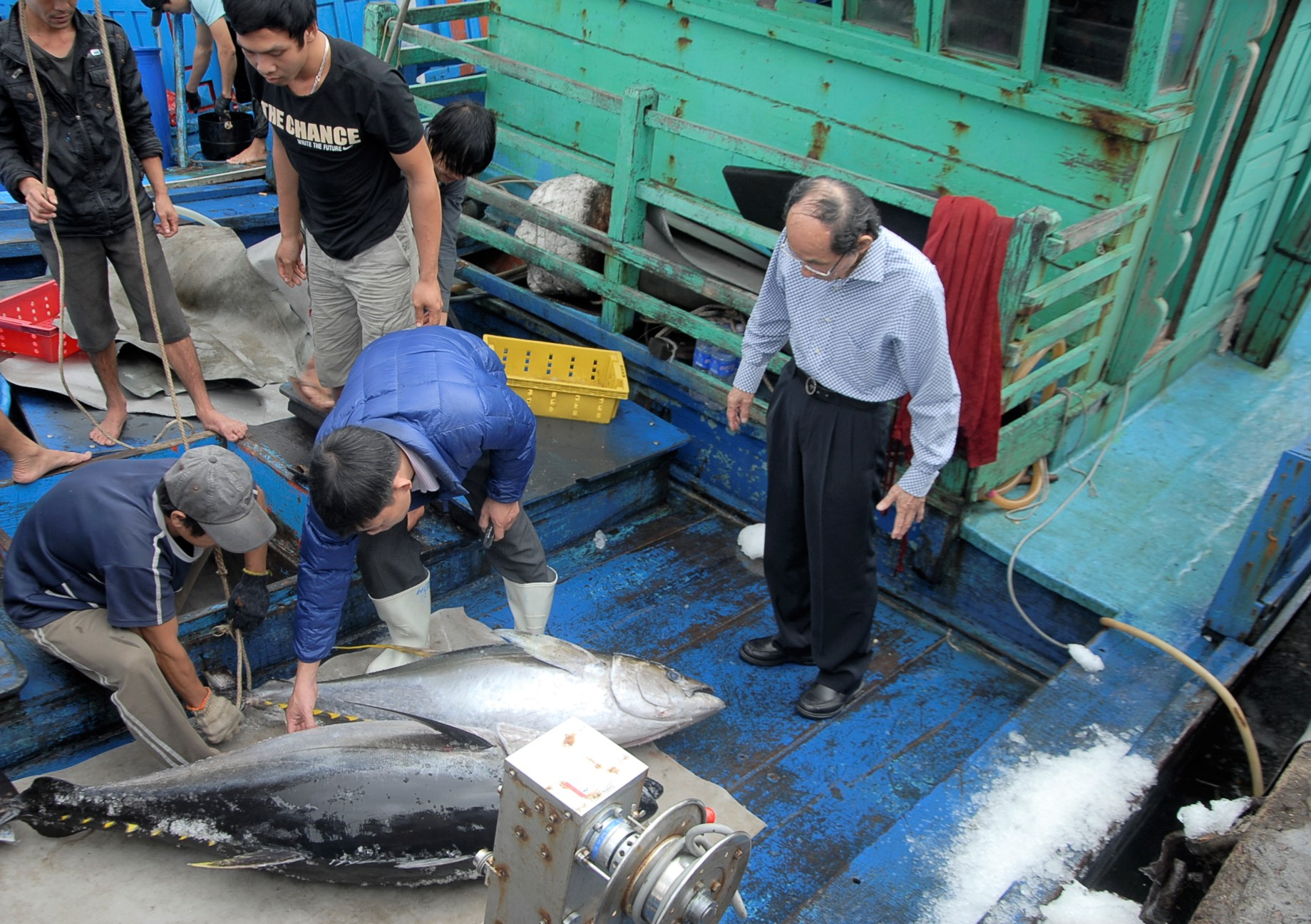
In 2015, the Japan - Vietnam Friendship Association in Sakai City implemented a project to transfer techniques and modern fishing gear in fishing activities to Binh Dinh fishermen. Photo: V.D.T.
According to Kato Hirosuke, Chairman of the Japan - Vietnam Friendship Association in Sakai city, taking the role of a bridge, the Japan - Vietnam Friendship Association of Sakai city continues to help Binh Dinh get access to Japanese investors in fields where Binh Dinh has potential, strengths, and needs.
Only four years after the establishment of the Japan-Vietnam Friendship Association in Sakai city, in 2015, the association implemented a project to transfer techniques and modern fishing gear in fishing activities, to improve the quality of ocean tuna, improve value and increase income for fishermen in Binh Dinh.
In 2019, the Friendship Association continued to coordinate and transfer techniques and technologies, such as a tuna shocker and a tuna preservation tunnel with nanotechnology, to help Binh Dinh fishermen successfully apply in exploiting and preserving tuna.
According to Kato Hirosuke, in addition to the projects being transferred technology, the Association is implementing many other projects in the field of agriculture in Binh Dinh, such as the Japanese cherry blossom development project in Vinh Son eco-tourism area belongs to Vinh Son commune (Vinh Thanh district), and an investment project to build a Japan - Binh Dinh Koi fish center.

Song Kon Forestry Co., Ltd is planting Japanese cherry blossom trees in Vinh Son commune (Vinh Thanh district, Binh Dinh province). Photo: V.D.T.
According to Takimoto Jo, representative of Marubeni Lumber Vietnam Company in Binh Dinh, this province has many advantages in developing the wood processing industry, thanks to the abundant source of wood materials. From surveying the source of raw materials, Marubeni Lumber Vietnam Company chose Binh Dinh as a place to stop.
Currently, in Vietnam, both the North and the South face difficulties such as the cost of renting premises, service prices, and labor shortage. Marubeni Lumber Vietnam Company does not have to deal with this situation, particularly in Binh Dinh.
According to Do Xuan Lap, Chairman of the Vietnam Timber and Forest Products Association, investing in Binh Dinh is a good opportunity for Japanese investors regarding wood processing because Binh Dinh has a very abundant plantation wood material area.
Binh Dinh is also the gateway connecting the South Central region with the Central Highlands provinces, so having more raw materials outside the province becomes a competitive advantage in attracting investment in this field.
"We know that the Japanese side importing furniture from Vietnam is mostly produced from planted forest wood, rubber wood. The Central Highlands is a large rubber development area. It is appropriate to invest in Binh Dinh to use the rubber wood material area from the Central Highlands to Binh Dinh via National Highway 19," said Do Xuan Lap.
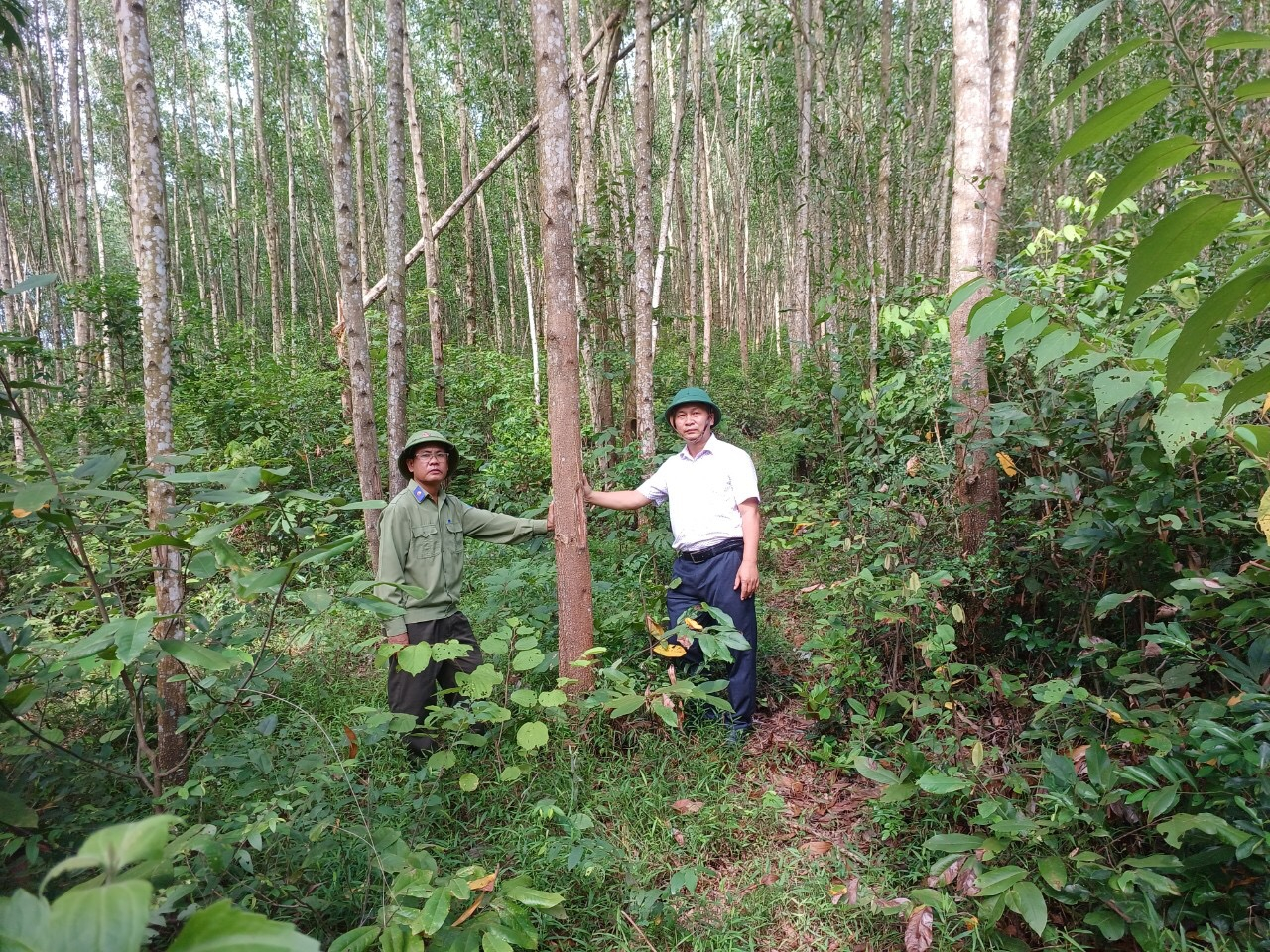
Binh Dinh has an affluent plantation wood material area, so it is a good opportunity for Japanese businesses to invest in forest product processing. Photo: V.D.T.
Kosaburo Kimura, Director of Mai Tin Binh Dinh Co., Ltd., affirmed that Binh Dinh province's government well supports businesses in the area.
Mai Tin Co., Ltd. is an enterprise specializing in seafood processing. This company chose Binh Dinh to invest in the factory because this locality has many advantages, especially the reserves of exploited fish to meet the company's demand for raw materials for production. After investing in Khanh Hoa province, Mai Tin Co., Ltd. sought a place to open a new factory. While exploring investment opportunities, the company received much support from the government in establishing a company.
Kosaburo Kimura said that, in the field of seafood processing, Mai Tin Binh Dinh Company had received direct support from the Binh Dinh Department of Agriculture and Rural Development in research, cooperation, and technology transfer of exploitation and consumption of ocean tuna.
“Besides tuna, we are researching more suitable fish for sashimi to export to the Japanese market. Currently, Mai Tin Binh Dinh Company is cooperating with the Binh Dinh Department of Agriculture and Rural Development and Quy Nhon University to research and turn waste production into fertilizer products for agricultural production, solving problems related to environmental pollution,” said Kosaburo Kimura, Director of Mai Tin Binh Dinh Co., Ltd.
Translated by Ha Phuc
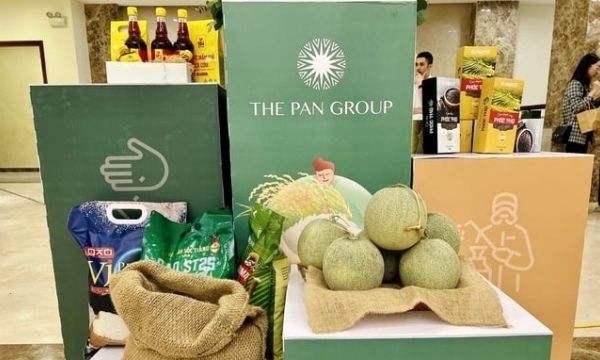
(VAN) In response to climate change concerns and economic challenges, PAN Group sets target of 12% revenue growth with natural agriculture solutions.
/2024/04/26/4910-3-173953_784.jpg)
(VAN) The Nestlé Net Zero Roadmap launched in 2020 has helped the Group transform its business operations and implement measures to reduce greenhouse gas emissions in all fields.
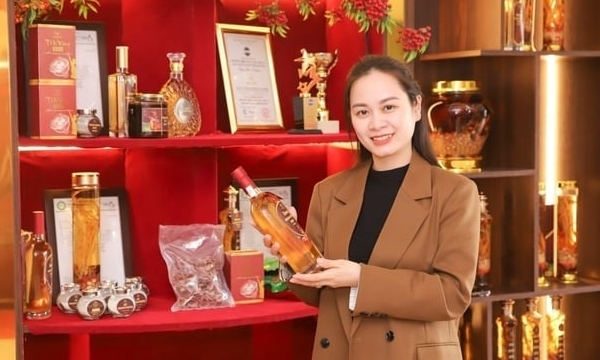
(VAN) Deer antler velvet is known as one of the 'Four Great Traditional Medicines'; however, the value-added aspect from the deep processing of deer velvet is currently overlooked.

(VAN) The three main factors causing the lack of sustainability in the growth of e-commerce in Vietnam are digital divide, digital workforce, and environment
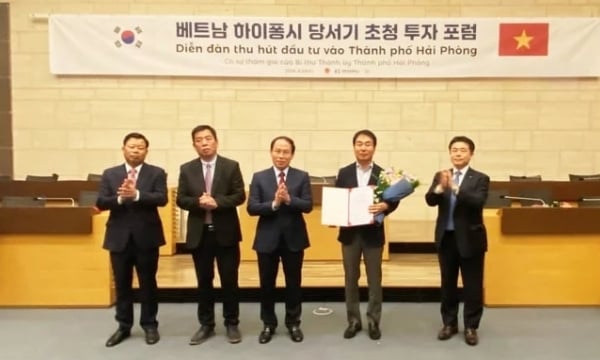
(VAN) South Korean enterprises have increased their investment capital in the city of Hai Phong by nearly VND 400 million following a series of meetings.
/2024/04/25/4132-3-083738_65.jpg)
(VAN) On the sandy area of Ly Trach commune, the model of growing Taiwan custard apples in a 'nature-based' direction has brought high economic efficiency.
/2024/04/24/1631-vmc-vietnam-aims-to-become-a-professional-veterinary-medicine-manufacturer-for-poultry-in-the-vietnamese-market-191200_621.jpg)
(VAN) In the 20-year journey (April 24, 2004 - April 24, 2024), from a distribution enterprise, VMC Vietnam rose to become a top-quality domestic veterinary medicine manufacturer in Vietnam.